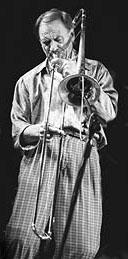Never Let It End
| Never Let It End | ||||
|---|---|---|---|---|
| Studio album by Albert Mangelsdorff | ||||
|
Publication |
||||
| Label (s) | MPS Records | |||
|
Format (s) |
LP, CD |
|||
|
Title (number) |
7th |
|||
|
running time |
43:35 |
|||
| occupation | ||||
|
Studio (s) |
Studio Walldorf Walldorf |
|||
|
||||
Never Let It End is a jazz album by the Albert Mangelsdorff Quartet , recorded on March 23, 1970 and released on MPS Records .
The album
The album Never Let It End was the Albert Mangelsdorff Quartet's first production after Günter Kronberg left in 1969. The Mangelsdorff Band now had a quartet with saxophonist Heinz Sauer , bassist Günter Lenz and drummer Ralf Hübner and Mangelsdorff even turned towards free play and collective improvisation . Albert Mangelsdorff said in an interview with Bruno Paulot about this development: “After Günter Kronberg left, we agreed at some point to forego topics entirely and only improvise freely.” After Günter Lenz, the musicians could “go even further. The harmony was dissolved, we only played sound centers, the rhythm was also more and more dissolved. The development went so that at some point we didn't play a topic at all ”.
For the reasons mentioned, for Albert Mangelsdorff the album Never Let It End was “a milestone, a turning point” and the result of the new conception of the interplay, which had crystallized in countless live performances. The night before, the Mangelsdorff Quartet had played at the Frankfurt Jazz Festival , "they just came off the stage, so to speak," said the trombonist in an interview with Bruno Paulot.
Rating of the album
Mangelsdorff considered the Never Let It End album to be a particularly successful recording by his quartet at the time; he particularly recalled the solo passages by Heinz Sauer on the alto saxophone and the collectively improvised parts. Mangelsdorff also counted Never Let It End among the outstanding albums on the European scene, precisely because of the connection between free improvisation and a certain adherence to tradition; he only regretted the under-committed marketing strategy by MPS after the original album was released in the 1970s.
Editorial notes
The album was released in a 2-CD edition by Universal Music, coupled with the 1978 record A Jazz Tune I Hope and Triple Entente (1982) and in the 2008 5-CD compilation Mangelsdorff Originals .
The titles
- Albert Mangelsdorff Quartet - Never Let It End (MPS 15274)
- Wide Open (Mangelsdorff) 3:45
- Never Let It End (Mangelsdorff) 9:48
- Certain Beauty (Mangelsdorff) 9:14
- 13th Color (R. Huebner) 6:54
- Open Mind (Mangelsdorff) 4:17
- Roitz and Spring (H. Sauer) 7:14
- Epilogue (H. Sauer) 1:50
literature
- Bruno Paulot: Albert Mangelsdorff. Conversations. Oreos, Waakirchen 1993, ISBN 3-923657-42-0 .
Web links
- detailed biography and discography on www.jazzpages.com
Notes and individual references
- ↑ Mangelsdorff's first quartet existed until 1972 and is much better documented on record than the second quartet with Sauer, Buschi Niebergall and Peter Giger , which existed until 1976.
- ↑ still in 1967 on the album Folk Mond & Flower Dreams had helped
- ↑ Quoted from B. Paulot, p. 112.
- ↑ Quoted from Paulot, p. 238.
- ↑ See Paulot., P. 238 f.
